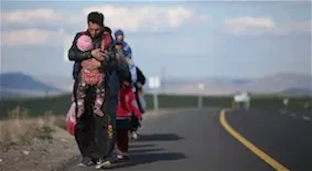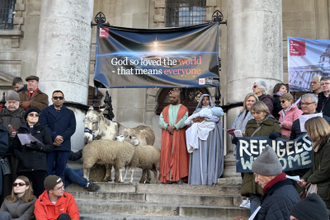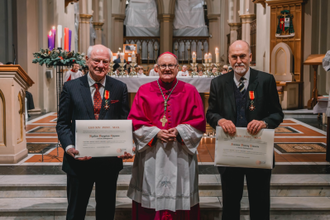Reflection: When did we see Jesus in a stranger?

Syrian refugees. Image: COMECE
Thomas Frost from London Catholic Worker gave the following reflection at the last Prayer Vigil for Migrants and Refugees opposite the Home Office. (See details below)
Those of us who are not saints are likely to find ourselves, eventually, asking the Lord "when did we see you a stranger?" We know in principle that what we do for the poor we do for Christ, but the definite moments when it becomes clearly imperative to act on that principle come up so rarely that, in practice, we generally do less than we should. We might recognise refugees and illegal migrants today as some of those people among whom Jesus told us we should expect to find him, but we so rarely come face-to-face with them that we are not often so moved. Moreover, the state has set up its border regime in such a way as to make it as difficult as possible for us to be good.
As far as possible, asylum seekers are prevented from reaching Britain in the first place, but are kept in Calais, so that when the French police destroy the belongings of migrants and leave them to sleep in the cold, when they sink small boats at sea and leave people to swim back to shore, it is not really treated as a political issue here in Britain, despite the fact that our government directly funds it, and created in the first place the exceptional situation whereby the border is moved to Calais for the purpose of enforcement but not for the purpose of asylum. Those asylum seekers who do manage to reach the UK are without exception detained on arrival, and generally placed in an immigration detention system designed to isolate them. As far as possible, irregular migrants and the violence used against them, paid for by you and me, are kept invisible, so that people don't, on the whole, think of these things as being done to human beings, but keep thinking in an abstract way about "securing the border". This is one of the benefits of "externalisation" for the authorities.
But there are limits to what the authorities can do in countries like Britain and France, with the remnants of a commitment to humans rights and a relatively open media able to report on abuses. Consequently, the policy of British and European governments is increasingly to outsource border violence to those governments and other groups which can get away with it. In recent years this has involved substantial payments to the border agencies of authoritarian and semi-authoritarian states along the north African coast through which many migrants travel in hope of reaching Europe via the Mediterranean. In September, Keir Starmer visited Rome to praise the supposed successes of these initiatives in reducing the number of those crossing the Mediterranean, and announced that £4 million would be given by the British state to the Rome Process, one of the funnels through which aid to these agencies is poured.
We often find that those crossing the Mediterranean are often more frightened of being returned to these countries than they are of dying at sea, to the point of refusing to send out distress calls until they are out of Tunisian or Libyan waters. The Tunisian government has openly adopted a practice of systematic pushbacks into the desert - men, women and children are driven out into the Sahara and abandoned, often with no food or water and with their phones confiscated. They are left to walk for days back to the coast or die in the attempt. Several mass graves have been found in the Sahara but there is no way of knowing how many have been murdered in this way, partly because the Tunisian government makes it virtually impossible for NGOs to operate there. A recent UN report [On this journey, no one cares if you live or die: Abuse, protection and justice along routes between East and West Africa and Africa's Mediterranean Coast - Volume 2. | UNHCR] found that twice as many people now die in the Sahara as drown in the Mediterranean. In exchange for this contribution to Europe's border security, European governments have given hundreds of millions of euros to the Tunisian government in the last few years, including €105 million given in 2023 specifically to fund Tunisian border control, in full knowledge of the methods used.
The situation in Libya is, if anything, even worse. There is no centralised coast guard or border force in Libya, which has been split between two rival governments since the civil war, each of which is effectively a coalition of smaller militias; the role of a coast guard is undertaken by these various militia groups. Those migrants who are captured while travelling through Libya, or intercepted by the so-called coast guard at sea, suffer what a UNHRC report, published last year, described as "an abhorrent cycle of violence". The report found "that migrants across Libya are victims of crimes against humanity and that acts of murder, enforced disappearance, torture, enslavement, sexual violence, rape and other inhumane acts are committed in connection with their arbitrary detention" - sexual slavery is also systematic. It is normal for migrants detained in Libya to be held for ransom, either from their own funds or their relatives', to the extent that forced labour and extortion have become what the report calls a significant source of revenue for Libyan militias and state institutions.
Facilitating this, European governments, including the British government, have given tens of millions of euros worth of aid to Libyan groups in the last few years to fund their actions at the border. Furthermore, European border agencies routinely share the coordinates of migrant boats with the so-called Libyan coast guard, even when merchant vessels and civilian rescue ships are much closer, because civilian ships would be unable to return rescued people to Libya under international law, as an unsafe country. As an example of what happens to those returned there, the UNHRC report cites a documented instance of a boy, a refugee detained in Ayn Zarah in Libya, who having been tortured, and in immense pain, hung himself. His body was left hanging in front of other migrants for a day and half before it was taken down by guards. There are countless similar stories. In the same month as this report was published, the British government announced another £1 million in funding for Libyan border authorities.
All this is being done, at least in part, on our behalf and with our tax money. It would not be accepted if it was happening in this country, but because it is being done far away, to people who are not deemed to matter, it is barely even reported on. It happens with the tacit acceptance of people in this country because we allow migrants to be marginalised - because, for the sake of a sense of security here in the centre, we are willing to overlook the violence at the border. This article was first given as a reflection at a monthly vigil outside the Home Office on Marsham Street, during which we name and mourn those killed each month crossing European borders. I hope that we thus play a very small part in opposing the border regime - Christians in this country have an obligation to rehumanise in the public mind those who are dehumanised by state policy. We have as much as we can to bring people who are marginalised into the centre of our communities. We have to keep talking about these things in the centres of power, of government, of the media, of the churches, of our own communities.
Our religion, after all, began with a crucifixion. It was such an awful and humiliating death, as far as the Romans were concerned, that the crucified person suffered a sort of social death as well - they were placed in a state of exception, as someone you couldn't relate to socially in a normal way. On the edges of settlements, they were marginalised in every possible sense. And when God came into the world that was where he chose to place himself, and for two thousand years we have been putting the cross right at the centre of our worship - that is what Christianity is. We are hypocrites, then, if we centre the cross but don't centre those being crucified at this moment. If there's any comfort to take from all this it's the certainty that, however successful or otherwise we are at walking alongside the marginalised, God will always be successful, because he himself won that victory on the cross. As Reverend Munther Isaac said at Christmas, God is under the rubble. God is in the deserts, in the detention centres, and at the bottom of the sea. If we want to find him, that's where he'll be. Jesus remains at the cross.
A Prayer Vigil for Migrants and Refugees is held on the third Monday of each month, opposite the Home Office, Marsham Street, SW1P 4DF 12.30-1.30 . Join us to pray for those who have died trying to reach the UK, the many victims of current wars, asylum seekers in detention centres, and those who are homeless and Those who struggle to inject welcome and humanity into our legislation. The vigil is organised by London Catholic Worker, Diocese of Westminster J&P Commission and London Churches Refugee Fund.
The next Prayer Vigil will take place on 21 October from 12.30 - 1.30pm
For more information email: homeofficevigil@gmail.com
LINK
London Catholic Worker: https:// www.londoncatholicworker.org

















